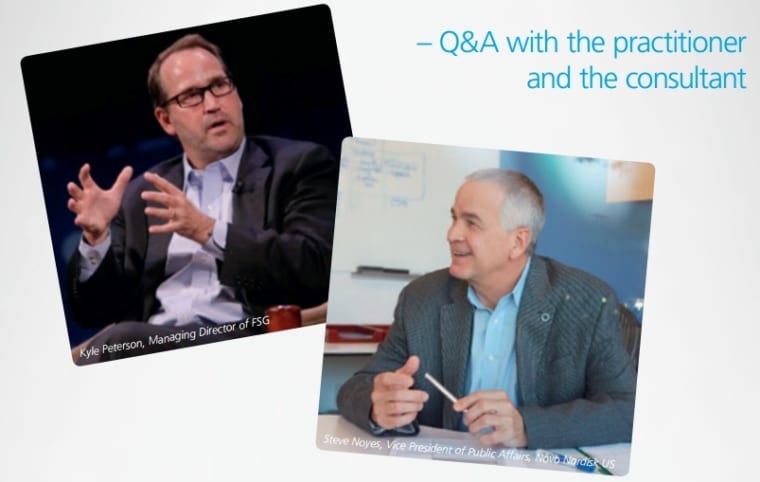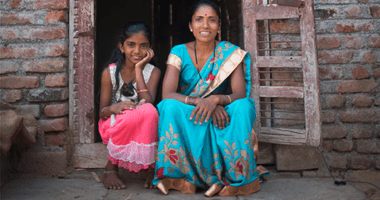The following is excerpted from Novo Nordisk’s TBL Quarterly. Read the full-length interview.
Shared Value is based on the idea that companies can increase profits and enhance competitiveness by solving societal problems. It was coined by Michael Porter and Mark Kramer in Harvard Business Review and is gaining ground both in business schools and boardrooms, but is shared value more than just an idea? Steve Noyes, Vice President of Public Affairs in Novo Nordisk US, and Kyle Peterson, Managing Director of FSG, think so. Here they discuss conceptual implications and concrete examples from the real world.
From your perspective, what is unique about the shared value approach? How does it differ from traditional business and corporate social responsibility (CSR)?
Steve Noyes: I think the shared value approach brings it all together. Traditional business and CSR tend to be more focused on one or the other—separately. However, shared value defines the synergies as it combines both objectives into one.
Kyle Peterson: I believe shared value builds upon the great thinking and practice of CSR, but there is a difference. Shared value is addressing social problems at scale while actually making a profit, so it is a business proposition. Traditional business does not always seek to address an unmet social need, which is not necessarily wrong, but then it is not shared value. CSR has a lot of interpretations, but one I refer to most often is when companies are mitigating their negative impacts on society or complying with business ethics standards—of course this is important, but it’s not necessarily creating shared value.
 Can the approach transform companies? And do you think it can be applied to companies across different industries and geographical locations?
Can the approach transform companies? And do you think it can be applied to companies across different industries and geographical locations?
Steve Noyes: Yes, but I think it may be easier for a health care company. By the nature of our business, we are doing things that address unmet needs for patients while being profitable. However, since it is the nature of the way we do business we should challenge ourselves to take it one step further. Shared value can transform a company’s thinking and planning to intertwine the social impact and the business opportunity to maximise the impact in both areas. I think shared value is a very important principle regardless of geography. It can be customised to the local level because it is about understanding the needs of communities and how you can link business opportunities into that. This is very consistent with our company’s Customer Focus Model.
Kyle Peterson: Absolutely, I have seen shared value applied in almost every sector, including banking, extractives and certainly pharma and medical device companies. For pharma, it is about moving beyond conventional market share and address new unmet needs. That can be done through development of new products, by making existing products available to populations that have not before had access to them or by making changes in the value chain or the enabling environment. It is about creating new opportunities to address health outcomes.
Have you experienced areas where stakeholders in society have opposite interests? Will there not always be areas where companies make decisions that benefit one stakeholder over another?
Steve Noyes: Yes, for example, our pricing approaches are often being questioned, but what I have learned over the years is that we must always start with the patient. If you approach your day to day work with a patient focus, it will allow you to engage in richer, truer and more meaningful dialogue with your stakeholders who will also help you reach your business objectives.
Kyle Peterson: This could be a controversial thought, but I think governments can wonder if there is a hidden agenda behind companies, and may not embrace what companies want to do although they have genuine intentions. I don’t think that it is necessarily about opposite interests, but more a kind of scepticism. Also, I don’t think a company—no matter who it is—can solve all unmet needs at once. It’s incremental and it’s tough because you are always going to be met with new expectations, but that is also what keeps you on your toes.
Steve Noyes: I think the devil is in the detail. When you execute and live by a shared value approach you have to balance both the social and the business component. My personal experience is that you can almost always find an overlap if you approach things with an open mind. But it requires negotiations and trade-offs and we need to constantly ask ourselves “are we doing the best we can?”




